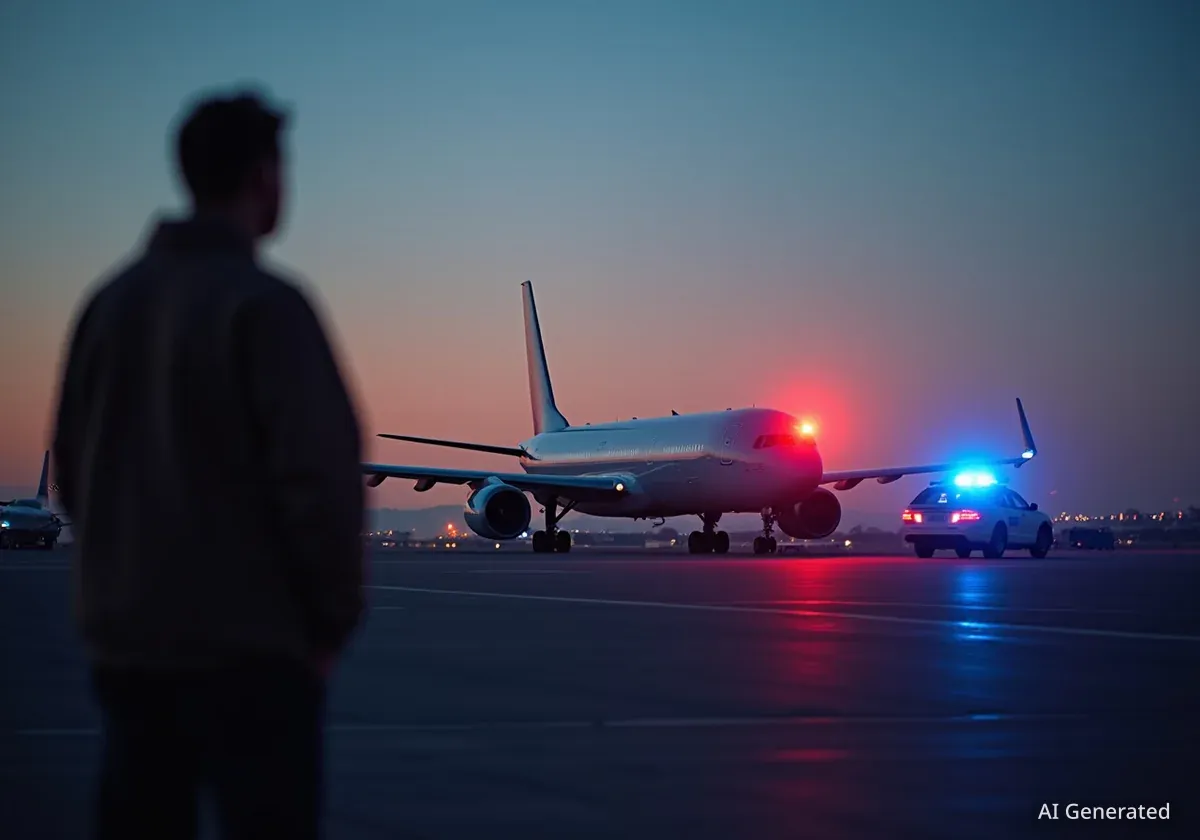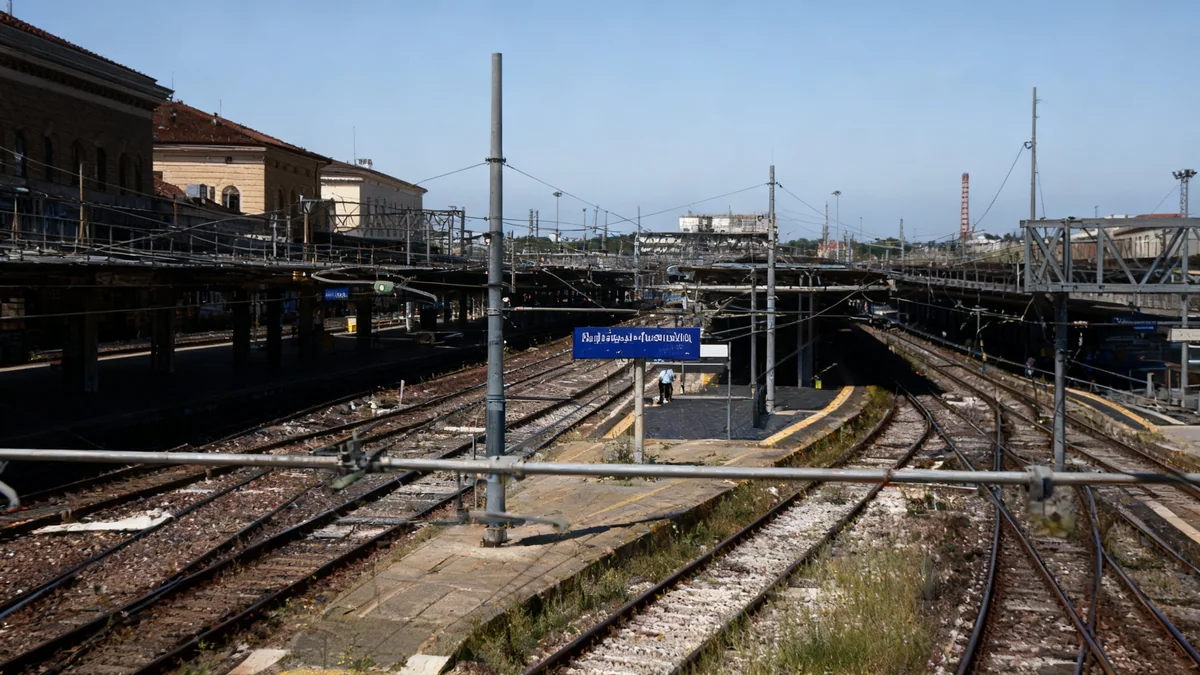A Frontier Airlines passenger faces multiple charges, including felony false report, after allegedly causing a significant delay and making a bomb threat on a flight at Nashville International Airport (BNA). The incident occurred on Tuesday, September 23, shortly before 8 a.m., involving a flight scheduled for Denver.
Authorities removed 35-year-old Kenneathya Lashay Dodson from the aircraft after flight attendants determined she was too intoxicated to travel. During her removal, Ms. Dodson reportedly resisted police and claimed to have a bomb, delaying the flight's departure by over 90 minutes.
Key Takeaways
- A Frontier Airlines passenger was removed from a flight for intoxication.
- The passenger resisted arrest and made a false bomb threat.
- The incident delayed the Nashville-Denver flight by over 90 minutes.
- Charges include felony false report, resisting arrest, and public intoxication.
Incident Unfolds at Nashville Gate
The situation began on Frontier Airlines flight F9 1750, which was preparing for departure from Nashville to Denver. Flight attendants observed Ms. Dodson's condition and concluded she was unable to fly safely due to intoxication. This determination led to the decision to remove her from the plane.
Airport police were called to Gate 2 to assist with the passenger's removal. According to reports, Ms. Dodson resisted officers, bracing her feet against seats to prevent being taken off the aircraft. This physical struggle prolonged the process.
During the altercation, Ms. Dodson reportedly yelled, "There’s a bomb right here!" and stated that "no one was going anywhere." This statement escalated the incident significantly.
False Bomb Threat Adds Felony Charge
The claim of a bomb on board immediately triggered a more serious response from authorities. While no actual explosive device was found, making such a threat carries severe legal consequences. The false report added a felony charge to Ms. Dodson's list of offenses.
The aircraft, originally scheduled to depart at 8 a.m., did not push back from the gate until 9:43 a.m. This delay of one hour and forty-three minutes directly resulted from the passenger's actions and the subsequent police intervention.
Incident Details
- Date: Tuesday, September 23
- Time: Shortly before 8 a.m.
- Location: Nashville International Airport (BNA), Gate 2
- Airline: Frontier Airlines
- Flight: F9 1750 to Denver
- Passenger: Kenneathya Lashay Dodson, 35
Legal Ramifications and Airline Policy
Kenneathya Lashay Dodson faces multiple charges stemming from the incident. These include felony false report, resisting arrest, public intoxication, and disorderly conduct. Each of these charges carries potential penalties, with a felony conviction being the most serious.
Airlines have the legal authority to refuse transportation to any individual deemed a potential safety risk. Under 49 U.S.C. § 44902(b), an airline can deny boarding to anyone who "is, or might be, inimical to safety." This broad authority allows carriers to remove passengers who are intoxicated or disruptive.
Airline Discretion
Airlines regularly make decisions about passenger suitability for travel. This includes evaluating a passenger's sobriety and behavior. The primary goal is to maintain safety and order on board, preventing situations that could endanger other passengers or crew members.
Impact on Airport Operations
Incidents like this one have a ripple effect across airport and airline operations. When an aircraft is delayed at a gate for an extended period, it can affect other flights. The gate itself may be needed for an arriving aircraft, leading to further delays for that flight.
Moreover, the delayed aircraft's subsequent flights in the schedule are also impacted. Crews may reach their maximum legal duty limits, potentially leading to further flight cancellations down the line. This creates a chain reaction of disruptions for travelers and airline staff.
According to aviation experts, false bomb threats, even when quickly debunked, require a full safety protocol. This involves additional checks and verification, further extending delays. Such procedures are necessary because crew members are not authorized to determine the credibility of a threat; they must treat all threats seriously.
Frequency of Incidents on Ultra-Low-Cost Carriers
Frontier Airlines, an ultra-low-cost carrier, frequently appears in news reports regarding passenger incidents. While these airlines operate with specific business models, the number of reported disturbances often draws attention.
For context, Frontier carries approximately 20% of the passenger volume compared to larger carriers like American Airlines. However, their share of widely reported incidents appears disproportionately high. This trend has led some observers to connect it to the pricing strategies and operational models of ultra-low-cost carriers.
- Ultra-low-cost carriers: Often feature lower fares.
- Democratization of air travel: These carriers have made flying accessible to a broader range of travelers.
- Operational challenges: High passenger volume and rapid turnarounds can sometimes strain ground services.
When passengers miss connecting flights due to such delays, especially on carriers like Frontier, options for re-accommodation can be limited. Ultra-low-cost airlines often have fewer same-day alternative flights and typically do not rebook passengers onto other airlines, leaving travelers with fewer immediate solutions.
Preventative Measures and Ground Services
Some critics argue that airlines and their ground service providers should implement more stringent checks before passengers board. Ensuring passengers are not visibly intoxicated prior to boarding could prevent many onboard disturbances.
Preventative measures at the gate are crucial for maintaining safety and preventing disruptions. While airlines aim for efficiency, the responsibility to ensure passenger suitability for travel remains paramount. Neglecting this step can lead to significant operational costs, legal issues, and negative passenger experiences.
This incident highlights the challenges faced by airline staff and law enforcement in managing disruptive passengers. The quick response from police and crew helped contain the situation, but the broader impact of such events on travel remains a concern for the industry.





